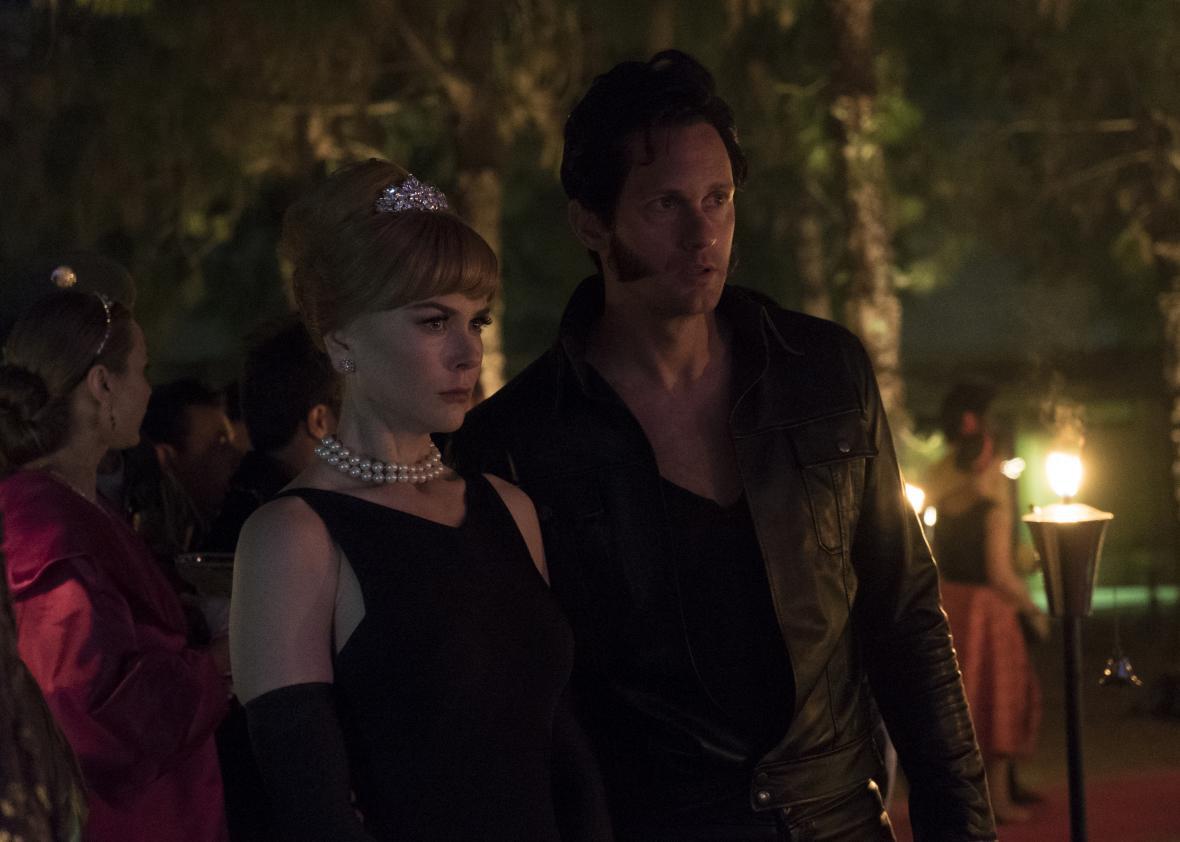And so at the end of the great Big Little Lies, murder brings peace to Monterey. A little justifiable, semi-accidental manslaughter was all that was needed to turn scathing burns into plowshares, raging animosity into pruning hooks, to get the stay-at-home mothers to lie down with the working mom, the first wife to curl up with the second, for everyone to frolic on the beach with their beatific children and some white wine, a neutered rendition of “You Can’t Always Get What You Want” intimating that the five central women have finally gotten what they need. That is, if you believe appearances, which is something Big Little Lies has cautioned us never to do.
Big Little Lies, closely based on Liane Moriarty’s novel of the same name, began with a murder. But the show’s hook was never homicide, so much as character—the personalities and dynamics of a group of affluent mothers living in splendor in Monterey, California. It was Reese Witherspoon’s bravura turn as Madeline Martha McKenzie, not the mysterious death, that was the show’s real opening enticement. It was Nicole Kidman’s Celeste, slowly revealing both to us and to herself her dire circumstance as a trapped and abused wife, who provided the series’ dramatic throughline, not the whodunit.
But a murder is what we were promised, and so, in the finale, a murder is what we got. The episode revealed the two pieces of information that have been withheld from the audience since the series’ opening scenes: the victim and the murderer, though neither of those terms, in this case, are fully accurate. The dead man is Perry Wright (Alexander Skarsgard), Celeste’s abusive husband, as well as Jane’s (played by Shailene Woodley) rapist. Perry dies after being pushed down a flight of stairs by Bonnie (Zoë Kravitz), who intervenes when she sees him mercilessly beating Celeste and flinging off Jane, Madeline, and Renata (Laura Dern) as they try to stop him.
Structurally speaking, we now understand why the identity of the dead person was kept secret. (Though it makes even less sense why Bonnie was so woefully underdeveloped that you need to read the book, or go to its Wikipedia page, to learn that she grew up with an abusive father.) Perry was the awful, menacing villain of Big Little Lies. If we knew he died from the start it would have alleviated the unbearable, frightening tension of his relationship with Celeste. As Celeste took the preliminary steps to leave Perry—as she goes to therapy, rents an apartment, fills its refrigerator—she was fearful of what would happen, what he would do, what he would do to her, what he would do to their children, and we were right there, fearful for her, afraid she might be the one to die. If we knew Perry was a goner, we would have watched that storyline in too much comfort.
Perry’s death initially seems like some kind of magical murder panacea, bringing harmony to Monterey. The five women appear to become thick as thieves, closing ranks to protect Bonnie. Their biggest lie, that Perry “tripped,” unites them, makes them the kind of clique who cavorts on the beach together with their beaming children. Madeline’s marital troubles seem to vanish in a hug. Her long-held animosity toward Bonnie evaporates in the crisis. Renata, who—minutes before Perry’s death—learned that it was Celeste and Perry’s son who had been physically abusing her daughter, is so ready to let bygones be bygones that the kids all romp together in the sand. Celeste’s sons, who were already scarred by having an abusive father, now have a dead one, but they too are bopping around in the sun—alongside a half-brother they may or may not know about, whose traumatized mother looks to have achieved closure and even cozied up with a princely barista. Suddenly, everything is perfect.
But nothing is perfect: This is Big Little Lies’ very premise. Rather than ending on a scene of genuine peace and harmony, Big Little Lies ends with some artfully arranged misdirection, encouraging us to see the happy ending we want to see, whether or not it’s there. Moments before the murder, with about 15 minutes left in the episode, the dialogue nearly ceases. The central characters are talking, but whether at the police station, at the funeral, on the beach, we can no longer hear them. Big Little Lies has shunted us, the audience, to the outside, where we watch the heroines from a distance, just like everyone else in town. The final shot is of the women seen through binoculars, presumably belonging to the grouchy police detective convinced the murder was no accident. From a distance, they look good.
But from a distance, who can say what’s real? Maybe the deus ex murder has healed everyone, or maybe we just can’t hear Madeline’s cutting asides and Renata’s high-frequency anxiety, can’t track Bonnie’s guilt and Celeste and Jane’s emotional recoveries. The cover-up has descended and we no longer have access to the truth, not of the murder, but of their lives.
